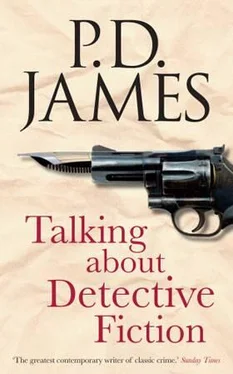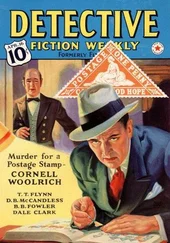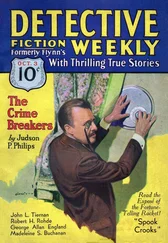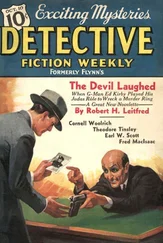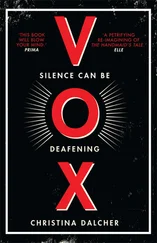One of the criticisms still levelled at the detective story of the Golden Age is frequently voiced in the clever phrase “snobbery with violence,” although when one considers Agatha Christie and her ilk, snobbery with a little local unpleasantness would be closer to the truth. The violence is necessarily there but it is so muted that it is sometimes difficult, reading an Agatha Christie, to remember exactly how the victim died. Parents might well complain if their adolescent son were continually reading Agatha Christie when it was time he turned to the books set for his next examination, but they would be extremely unlikely to complain that he was immured in nothing but horror and violent death. But the allegation of snobbery is reiterated, particularly with regard to the women writers of the 1930s, and what I think many people forget is that those writers were producing for an age in which social divisions were clearly understood and generally accepted since they seemed an immutable part of the natural order. And we have to remember that the detective novelists of the thirties had been bred to a standard of ethics and manners in public and private life which today might well be seen as elitist. Even so, Dorothy L. Sayers in her fiction can be seen as something of an intellectual snob, Ngaio Marsh as a social snob and Josephine Tey as a class snob in her characters’ attitudes to their servants, and there are risible passages which are difficult to read without embarrassment, including the unfortunate tendency of Ngaio Marsh’s suspects to say what a comfort it is to be interrogated by a gent. I wonder what they would have made of the Continental Op.
This acceptance of class distinction was not confined to novelists. I have a number of volumes of the successful plays of the thirties, and almost without exception dramatists were writing for the middle class, about the middle class and were themselves middle class. This was, of course, decades before, on 8 May 1956, the English Stage Company produced John Osborne’s iconoclastic play Look Back in Anger . Servants do appear in the interwar plays, but usually to provide what is seen as the necessary comic relief. Popular literature, whether detective stories or not, accepted the same division. Today the gap is between those who have wealth and celebrity-whether achieved through natural talent or, more commonly, as artefacts of the media-and those who have not. It is ostentatious wealth that bestows distinction and privilege. Although this new division has its disagreeable aspect, perhaps it is a fairer system since everyone can hope, however unreasonably, to win the lottery and move into the charmed circle of unlimited consumption and media attention, whereas distinction by breeding is immutably fixed at birth and intellectual ability in all classes largely the result of inherited intelligence which in the more fortunate can be fostered by good education. Snobbery is always with us; it merely embodies different prejudices and is directed at different victims. But I would expect even the most assiduous class warrior to welcome a form of popular literature which confirms the universal truth that jealousy, hatred and revenge can find a place in every human heart. In detective fiction the successful middle-class character is more often than not the murderer, and some would say with much less excuse than have the unfortunate and deprived. In general, the butler didn’t do it.
The resilience of detective fiction, and particularly the fact that so many distinguished and powerful people are apparently under its spell, has puzzled both its admirers and its detractors and spawned a number of notable critical studies which attempt to explain this puzzling phenomenon. In “The Guilty Vicarage,” W. H. Auden wrote that his reading of detective stories was an addiction, the symptoms being the intensity of his craving, the specificity of the story, which, for him, had to be set in rural England, and last, its immediacy. He forgot the story as soon as he had finished the book and had no wish to read it again. Should he begin a detective story and then discover it was one he had already read, he was unable to continue. In all this the distinguished poet differed from me and, I suspect, from many other lovers of the genre. I enjoy rereading my favourite mysteries although I know full well how the book will end, and although I can understand the attraction of a rural setting, I am frequently happy to venture with my favourite detectives onto unfamiliar territory.
Auden states that the most curious fact about the detective story is that it appeals precisely to people who are immune to other forms of what he describes as daydream literature. He suspects that the typical reader of detective stories is, like himself, a person who suffers from a sense of sin, by which he is not implying that mysteries are read solely by law-abiding citizens so that they may gratify vicariously the impulse to violence. The fantasy which the mystery provides is one of escape to a prelapsarian state of innocence, and the driving force behind the daydream is the discomfort of an unrecognised guilt. Since a sense of guilt seems natural to humanity, Auden’s theory is not unreasonable and some critics have suggested that it explains the otherwise curious fact that the detective story had its beginning and flourishes best in Protestant countries, where the majority of people don’t resort to confession to a priest in order to receive absolution. It would be interesting to test this theory, but I hardly feel that an approach to the Archbishop of Canterbury and the Cardinal Archbishop of Westminster suggesting that their priests should take an exit poll after Sunday morning services would be sympathetically received. But certainly a sense of guilt, however ungrounded, seems inseparable from our Judeo-Christian inheritance, and few people opening their door to two grave-faced detectives with a request that they should accompany them to the police station would do so without a qualm of unease, however certain they may be of their complete innocence.
Other critics, particularly it seems in the U.S.A. and Germany, have attempted to explain addiction to the genre in Freudian terms. Apparently we mystery fans are innocent in the eyes of the criminal law but are burdened with “an unconscious hysteric-passive tension,” stemming in men from the “negative” Oedipus complex, in women from the “positive” Oedipus, and can obtain from detective stories temporary and vicarious release of tension. I suppose we must be grateful that, despite the complications of our psyche, we are law-abiding citizens who do no harm to others.
For those of us uneducated in the recesses of abnormal psychology, the attractions of the detective story are more obvious. Firstly, there is, of course, the story.
Yes-oh dear yes-the novel tells a story. That is the fundamental aspect without which it could not exist… We are all like Scheherazade’s husband in that we want to know what happens next. That is universal and that is why the backbone of a novel has to be a story… Qua story, it can have only one merit: that of making the audience want to know what happens next. And conversely it can only have one fault: that of making the audience not want to know what happens next. These are the only two criticisms that can be made on the story that is a story. It is both the lowest and simplest of literary organisms. Yet it is the highest factor common to all the very complicated organisms known as novels. [E. M. Forster, Aspects of the Novel ]
Certainly all the major novelists in the canon of English literature have told stories, some exciting, some tragic, some slight, some mysterious, but all of them have the virtue of leaving us with a need to know what happens next as we turn each page. For a time in the late twentieth century it seemed that the story was losing its status and that psychological analysis, a complicated and occasionally inaccessible style and an egotistic introspection were taking over from action. Happily there now seems to be a return to the art of storytelling. But this, of course, the detective novel has never lost. We are presented with a mystery at the heart of the novel and we know that by the end it will be solved. Very few readers can put down a detective story until it is solved, although some have fallen into the reprehensible expedient of taking a quick look at the last chapter.
Читать дальше
